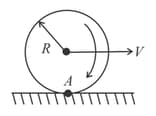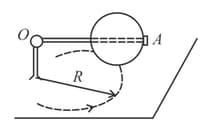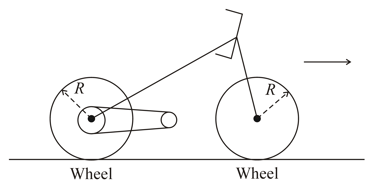Embibe Experts Solutions for Chapter: Rotational Mechanics, Exercise 4: Exercise - 4
Embibe Experts Physics Solutions for Exercise - Embibe Experts Solutions for Chapter: Rotational Mechanics, Exercise 4: Exercise - 4
Attempt the free practice questions on Chapter 10: Rotational Mechanics, Exercise 4: Exercise - 4 with hints and solutions to strengthen your understanding. Alpha Question Bank for Engineering: Physics solutions are prepared by Experienced Embibe Experts.
Questions from Embibe Experts Solutions for Chapter: Rotational Mechanics, Exercise 4: Exercise - 4 with Hints & Solutions
A particle moves along a closed trajectory in a central field of force where the particle's potential energy ( is a positive constant, is the distance of the particle from the centre of the field). Find the mass of the particle if its minimum distance from the point equals and its velocity at the point farthest from equals .
The angular momentum of a particle relative to a certain point varies with time as , where and are constant vectors, with . Find the force moment relative to the point acting on the particle when the angle between the vectors and equals .
A plank of mass , with a uniform sphere of mass placed on it, rests on a smooth horizontal plane. A constant horizontal force is applied to the plank. With what accelerations will the plank and the centre of the sphere move, provide there is no sliding between the plank and the sphere?
A force is applied to a point whose radius vector, relative to the origin of coordinates , is equal to , where , , and are constants, and and are the unit vectors along and -axes. Find the moment and the arm of the force , relative to the point .
A vertically oriented uniform rod, of mass and length , can rotate about its upper end. A horizontally flying bullet, of mass , strikes the lower end of the rod and gets stuck on it; as a result, the rod swings through an angle . Assuming that find
the velocity of the flying bullet
the momentum increment in the system "bullet-rod" during the impact; what causes the change of that momentum
at what distance , from the upper end of the rod, the bullet must strike, for the momentum of the system "bullet-rod" to remain constant during the impact.
A point is located on the rim of a wheel of radius which rolls without slipping along a horizontal surface with velocity as shown in figure. Find:
(a) the modulus and the direction of the acceleration vector of the point ;
(b) the total distance s traversed by the point between the two successive moments at which it touches the surface.

A uniform sphere of mass and radius rolls without sliding over a horizontal plane, rotating about a horizontal axle . In the process, the centre of the sphere moves with velocity along a circle of radius Find the kinetic energy of the sphere.

Consider a bicycle in vertical position accelerating forward without slipping on a straight horizontal road. The combined mass of the bicycle and the rider is and the magnitude of the accelerating torque applied on the rear wheel by the pedal and gear system is . The radius and the moment of inertia of each wheel is and (with respect to the axis) respectively. The acceleration due to gravity is .
(a) Draw the free diagram of the system (bicycle and rider ).

(b) Obtains the acceleration in terms of the above-mentioned quantities.
(c) For simplicity assume that the centre of mass of the system is at height from the ground and equidistant at from the centre of each of the wheels. Let be the coefficient of friction (both static and dynamic) between the wheels and the ground. Consider and no slipping. Obtain the conditions for the maximum acceleration of the bike.
(d) For calculate .
